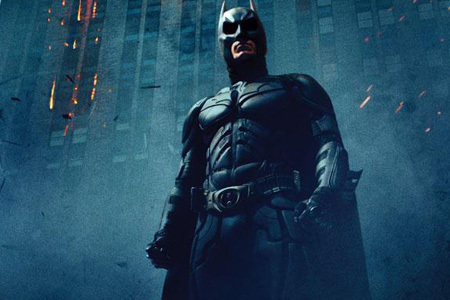Christopher Nolan’s The Dark Knight (2008) is not science fiction in the usual way the superhero films are. There is no godlike alien wandering around Earth, nor a man in a robot suit.* The Dark Knight is, instead, a psychological science fiction movie about an extreme, impossible mentality, obsessively driven to tear down civilization, and how the guardians of society try and fail to deal with him.
*Batman’s wonderful toys notwithstanding.
To be blunt, people like the Joker, brilliantly portrayed by Heath Ledger, simply do not exist in the real world. Yes, there are those who “just want to watch the world burn,” but the Joker is perfectly evil. There is no part of him the audience can identify with. He has no origin, no motive, and no objective other than the destruction of the very idea of society.
And he’s not crazy, in the usual sense. He understands what’s going on in the world, knows what he wants to happen, and exactly what to do in order to achieve it. It’s just that his goals are monstrous to most people, and he’s inhumanly good at his job. The Joker plans his crimes meticulously, from the order his goons kill each other to the size of each explosion, and every action he takes, including being arrested, furthers his goal of destroying Gotham. The combination of unfathomable motives and impossible competence make him basically an alien.

Compare Jack Nicholson’s Joker from Batman (1989) to Ledger’s. In Tim Burton’s film, the fantastic nature of the Joker was expressed in his weapons; deadly joy buzzers, comically large guns, giant floating babies that spewed toxic laughing gas. However, he was still understandably motivated by lust and revenge. In contrast, Ledger’s Joker uses bullets, knives, gasoline, and, memorably, a pencil, which he makes a point of saying are cheap and common. It’s his mind that makes Ledger’s Joker a super-villain. He’s not just a criminal, he’s the embodiment of crime.
And thus The Dark Knight is science fiction about how people deal with crime, with existential threats to society itself, and the answer seems to be, “not well.” For most of the movie, the options presented to Batman, Gordon, and Harvey Dent are either acquiesce to the Joker’s demands or, as Michael Caine puts it, “burn the forest down,” spy on all of Gotham, torture potential witnesses left and right, and ignore the collateral damage, whether that’s blowed-up girlfriends, physically and mentally scarred DAs, possible war with China, or a shit-ton of murdered cops. And since destroying Gotham is the Joker’s goal, either way, he wins.
The punchline of the film is that the Joker’s game is a false dilemma. No one has to play. The only truly heroic moment in the film comes from an unnamed Tattooed Criminal (the scene stealing Tommy Tiny Lister), who, presented with the chance to save his own life by killing hundreds of people, throws the detonator out the window, with a disgusted look for anyone who would consider doing differently. Notably, the criminal’s noble act seems in NO WAY inspired by Batman.
In fact, the whole film acts as a condemnation of vigilante justice. Batman is particularly bad at fighting the idea of crime. Sure, a transforming car and mad ninja skills are useful in a fight, but using these powers in the dark, without the rule of law or open conduct as a masked dictator (Batman is explicitly compared to Caesar) does nothing to support society and only feeds into the Joker’s plans. The Joker has an unlimited number of minions (including within the police department), Batman limits himself to a handful of allies. Batman inspires no one but idiots in hockey pads and the Joker himself, while the Joker brings out the worst in criminals, the general populace, and most obviously, in Gotham’s best defender, Harvey Dent. That Batman can’t save Harvey, in the end, is his ultimate failure: he can’t inspire good in even the best man he knows.
Batman’s decision to take the fall for Harvey’s crimes, to be hunted and hated in Gotham, serves two purposes: first, it elevates Harvey’s tactics of open government over Batman’s own more direct methods as the right way to fight crime, even when it fails, AND it serves as a punishment for Batman for letting the Joker do as much damage as he did. The Dark Knight is one of the most interesting and fascinating science fiction movies of the last ten years specifically because it takes two hours to prove, beyond a doubt, that the hero is wrong, that Batman is the wrong way to fight crime. I honestly can’t wait for next year’s The Dark Knight Rises. After such a thorough deconstruction of the idea of Batman in the face of the idea of crime, I wonder how Nolan will put him back together again.
Steven Padnick is a comic book editor. By day.










